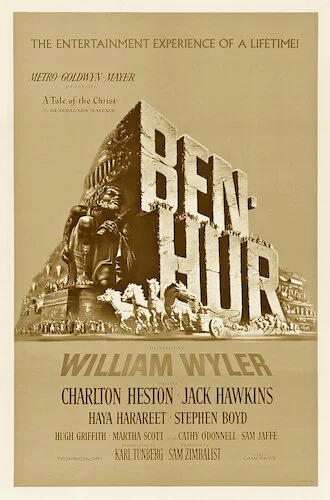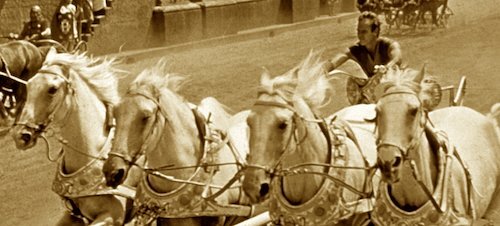Ben-Hur
This review is a part of the Best Picture Project: a review of every single Academy Award winner for the Best Picture category. Ben-Hur is the thirty second Best Picture winner at the 1959 Academy Awards.
So... Ben-Hur, huh?
This is the second film adaptation of the Lew Wallace novel Ben-Hur: A Tale of the Christ, and the first cinematic version to not have people die on set (although a producer of the William Wyler version did pass away from a heart attack during production). Nonetheless, any version of this Biblically influenced tale has a major mythos attached to it, either in the form of acclaim, or with production nightmares. For me personally I kind of am fine with it, and that's about it.
Let me explain. It might seem weird that I don't particularly care for a film that is tied for the most amount of Academy Award wins in history (eleven; it is tied with Titanic and The Return of the King). It is probably strange that I'm backing off of a classic like Ben-Hur. I see the merit in the incredible production: nothing can be taken away from the chariot sequence, and its impact on cinema (dare I call it one of the greatest sequences ever). I cannot shrug at Charlton Heston's commanding performance as Judah Ben-Hur.
The chariot sequence remains a milestone in cinema, for its choreography, editing, stunts, and score.
I do feel the film is overly long: at nearly four hours, some scenes simply do nothing to encourage the speed of the film. When a war ship goes through ten thousand different speeds for the slaves on board to go through, that's the kind of thing I'm talking about. We get the picture after the first three or so speed increases; either that, or cut to the final speed to create a more damning contrast. I'm not William Wyler, though, so trying to correct a cinematic legend likely sounds presumptuous, and I apologize. I'm simply trying to make the point that Ben-Hur maybe hasn't transitioned too well into the new millennium (especially not with that garbage 2016 remake).
Another issue I personally have, is not fully understanding why Ben-Hur's life had to intersect with that of Jesus Christ. We can argue that Jesus was a figure of inspiration for Ben-Hur, and that there may be parallels between Ben-Hur's recovery, and Jesus's betrayal and crucifixion. If that's the case, I just don't see the ties as being all that strong. I say this as someone who knows the writings of the new testament. What if someone didn't? Would just having Jesus mill around in the background of occasional scenes (in a four hour film, mind you) make any sense?
All of Ben-Hur rests on Charlton Heston’s dynamic performance. Weaker scenes get saved, and great scenes get turned into gold.
Ignoring all of my petty complaints, Ben-Hur is still a ginormous feat with its production and design. Ben-Hur wasn't even remotely the first historical epic (hell, it wasn't even the first Ben-Hur), but it is a textbook case on how detailed a production can be. You feel as though you have been transported back in time. The illusion of any of this being a film set disappears very quickly. For such a long film from the late '50s, that's a big accomplishment.
For me, especially as someone very familiar with the works of William Wyler, Ben-Hur feels like a step down from the usual connection the late filmmaker could create between his audience and the characters on screen. As if this was a sacrifice, Ben-Hur is easily his most jaw dropping film as an experience. Take what you will from that. Even though I feel there are narrative issues, it's very easy to be swept off your feet for at least a good portion of this lengthy mission. Behind Heston's performance, marching through Ben-Hur still feels like an enjoyable journey. It's easily the best version of Ben-Hur as well, although the competition isn't all that fierce. It's captivating entertainment worth trying at least once.
Andreas Babiolakis has a Masters degree in Film and Photography Preservation and Collections management from Ryerson University, as well as a Bachelors degree in Cinema Studies from York University. His favourite times of year are the Criterion Collection flash sales and the annual Toronto International Film Festival.






